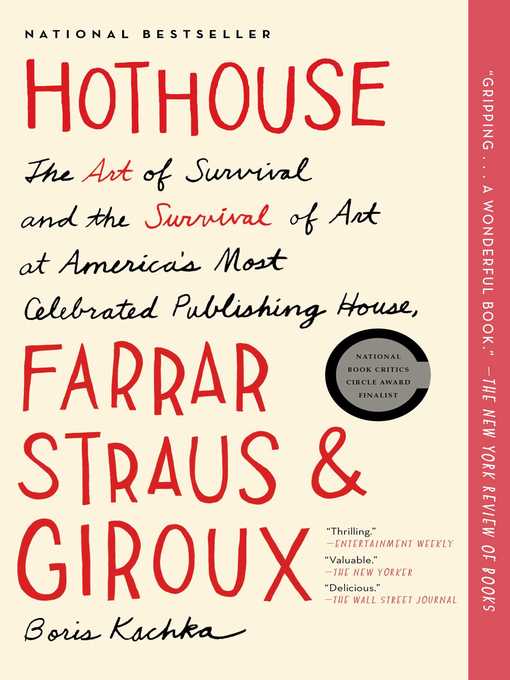
Hothouse
The Art of Survival and the Survival of Art at America's Most Celebrated Publishing House, Farrar, Straus, and Giroux
کتاب های مرتبط
- اطلاعات
- نقد و بررسی
- دیدگاه کاربران
نقد و بررسی

March 18, 2013
The New York book world, poised between scruffy glamour and crass commercialism, emerges in this lively chronicle of an iconic institution. New York magazine contributing editor Kachka chronicles the midsized independent publishing house whose mission of bringing high culture to the mass market set the tone for postwar American letters. The saga’s charismatic ringmaster is Roger Straus, FSG’s ebullient, profane part owner and publisher. His tangled relationships with a string of brilliant writers, including Edmund Wilson, Susan Sontag, Tom Wolfe, and Philip Roth, are equal parts paternalistic and exploitative; authors loved FSG’s support and sympathy—Straus and his editors championed difficult writers and nurtured blocked, broke, and addicted ones—but the substandard advances, not so much. Threading through Kachka’s juicy narrative is an epochal shift in the industry: from the old FSG, with its shabby offices, lewd banter, nonstop adulteries, dysfunctional quasi-familial relations between authors and the publisher, and febrile literary passions, to the new era of bland media conglomerates, for which books are but transitory business partnerships between executives, authors, and celebrity agents. Entertaining, accessible, smart, and thought-provoking, this is a book very much in tune with the lost literary milieu it recreates. Photos. Agent: Jane Dystel, Dystel & Goderich Literary Management.

March 15, 2013
One thinks of Farrar, Straus, & Giroux in lofty terms--after all, it publishes more Nobel prize winners than any other house worldwide--so it's intriguing to see this account described as juicy. Kachka, a contributing editor at New York magazine, draws on five years' worth of research to tell the story of the two men who made FSG an unshakable force in postwar culture: tough-minded founder-owner Roger Straus and sharp, quiet editor Robert Giroux.
Copyright 2013 Library Journal, LLC Used with permission.

July 1, 2013
John Farrar (18961974), a quick-to-anger High Episcopalian editor, and Roger Straus (19172004), a wealthy, charismatic Jewish prep-school jock, joined forces in 1946 to launch a New York publishing house. In 1955, Straus hired the immensely talented editor Robert Giroux (19142008), a working-class Jersey City Jesuit. Journalist Kachka tells Farrar and Giroux's intriguing stories with zest, but Straus is the sun around which this scintillating history revolves. Possessed of lordly benevolence and canny calculation, Straus ran a cosmopolitan, intellectual, if shabby kingdom where sex was the currency of the realm, a CIA connection opened doors to overseas writers, parties served as publicity campaigns, and the prestigious literary house of Farrar, Straus & Giroux published a record-making 25 Nobel laureates. Writing with vigor, skill, and expertise and drawing on dozens of in-depth interviews, Kachka shares risqu' gossip and striking insider revelations and vividly profiles the house's world-shaping writers, including Flannery O'Connor, Tom Wolfe, and Susan Sontag. Kachka's engrossing portrait of an exceptional publishing house sheds new light on the volatile mixture of commerce, art, and passion that makes the world of books go round.(Reprinted with permission of Booklist, copyright 2013, American Library Association.)

























دیدگاه کاربران